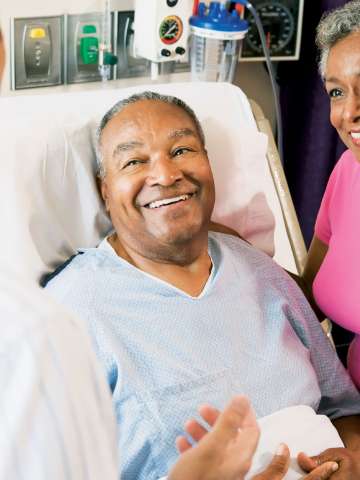Colorectal Surgery

UCLA Health excellence in colorectal surgery
Our colorectal surgeons expertly diagnose and treat all types of colon and rectal disease. We are committed to providing patients the highest level of care while also conducting meaningful research and training future generations of surgeons.
Highlights of our colorectal surgery program include:
Patient-centered care: Our surgeons recognize that colorectal conditions can be uncomfortable or distressing. We listen to your concerns and help you understand your treatment options. We strive to deliver the very best care with compassion and skill.
Advanced surgical techniques: We use a wide range of advanced surgical approaches, including minimally invasive and robotic surgery. Our colorectal surgeons opt for a minimally invasive approach whenever possible. They also have the expertise to offer complex open surgeries when minimally invasive techniques aren’t appropriate.
Research-driven treatments: As a leading academic center, UCLA Health consistently participates in and conducts research studies to improve care. These studies drive our treatment options. Clinical trials often enable us to offer you new and groundbreaking therapies.
Our areas of care
We treat colorectal disease through targeted programs, including:
Colorectal Cancer Treatment Program
Surgeons in the UCLA Health Colorectal Cancer Treatment Program offer state-of-the-art, comprehensive care for patients with colon and rectal cancer. We use an efficient, integrated approach that involves the expertise of multiple specialists. Many of our physicians are nationally recognized leaders who actively engage in colorectal cancer research, bringing you new treatment options and clinical trial treatments.
UCLA Hereditary Cancer Risk Program
Some genetic factors or conditions can increase your risk of developing colorectal cancer. Cancer genetic counselors in the UCLA Hereditary Cancer Risk Program offer personalized risk assessments to help you and your family be proactive with your health. We help you understand your risk factors, as well as recommend individualized guidance to manage and reduce your risks.
Center for Inflammatory Bowel Diseases
We treat inflammatory bowel disease (IBD), chronic inflammation in the digestive tract, with a team-based approach. IBD symptoms can be unpredictable and disrupt your day-to-day life. We aim to help you find effective treatment options so you can live a high quality of life. The team includes:
- Colorectal surgeons
- Gastroenterologists
- Hepatologists
- Pathologists
- Radiologists
- Registered dietitians
Colorectal conditions we treat
We treat a comprehensive range of conditions that affect the colon, rectum, small intestine and anus, including:
Anorectal conditions
Anorectal conditions may affect the anus and anal canal, the short tube that connects to your rectum and passes stool out of your body. They may also include conditions that affect the rectum, the lower portion of the large intestine (colon). These conditions may include:
- Anal carcinoma: Cancer that starts in the anal canal
- Anal condyloma: Warts around or inside the anus, caused by human papillomavirus (HPV), the most common sexually transmitted disease (STD)
- Anal fissure: A small tear in the tissue (mucosa) that lines the opening of the anus
- Anal fistula: An irregular tunnel that forms beneath the skin and connects an infected anal gland to an opening in the skin
- Anorectal abscess: A collection of pus under the skin around the anus and rectum, often caused by an infected anal gland
- Hemorrhoids: Swollen, enlarged veins in the anus or lower rectum
- Pilonidal sinus: A small hole in the skin at the top of the buttocks. If the hole fills with fluid or pus, a pilonidal cyst may form.
- Pruritus ani (anal itching): Chronic and intense itching around the anus, often worsening after a bowel movement or at night
- Rectal polyps: A small growth in the rectum that forms from excess tissue
- Advanced or severe anorectal conditions may include:
- Anorectal stricture (anorectal stenosis): Narrowing of the anal or rectal canal that can cause difficulty passing stool
- Fecal incontinence: A loss of bowel control, leading to unexpected stool leakage
- Rectal prolapse: A condition in which the rectum slips from its normal position and pushes into the anal canal
- Retrorectal tumors: Irregular masses of cells that grow and divide uncontrollably in the retrorectal space. This is the area in the pelvis behind the rectum and in front of the tailbone (coccyx) and pelvic bones (sacrum).
- Rectovaginal fistula: An irregular connection between the vagina and rectum that can cause gas or stool to enter the vagina
Abdominal conditions
Abdominal conditions can affect any part of the digestive tract, including the anus, rectum and large intestine. These conditions may include:
- Appendiceal tumors: Tumors that start in the appendix, a small pouch on the right side of the colon. The most common types include mucoceles, cystadenomas and adenocarcinomas.
- Appendicitis: Inflammation in the appendix. If not treated right away, the appendix may burst and spread infection. Treatment typically involves emergency surgery to remove the appendix.
- Carcinoid tumors: Tumors that form from neuroendocrine cells, cells that produce hormones. They often grow in the lining of the appendix, small intestine (tube that connects the stomach and large intestine) or rectum.
- Colon cancer: A type of cancer that occurs when irregular cells form in the colon
- Colon polyps: A small growth that forms on the inner lining of the colon. A polyp may initially be noncancerous, but it can develop into cancer if not treated.
- Colonic volvulus: An emergency condition that occurs when the colon twists around the tissue that surrounds it. It can result in an intestinal obstruction.
- Diverticulitis: Inflammation and infection in small pouches (diverticula) that form in the digestive tract
- Enterocutaneous fistula: An irregular connection that forms between the stomach or intestinal tract and the skin. It causes the contents of the intestines or stomach to leak through the skin.
- Familial adenomatous polyposis (FAP): A rare, inherited syndrome that causes the growth of hundreds or thousands of polyps inside the colon and rectum. It can potentially lead to colorectal cancer.
- Inflammatory bowel disease (IBD): A term for conditions that cause chronic (long-lasting) inflammation in the digestive tract
- Crohn’s disease: A type of IBD that causes intermittent inflammation in any part of the digestive tract from the mouth to the anus
- Ulcerative colitis: A type of IBD that causes consistent inflammation along the entire large intestine (colon)
- Lower gastrointestinal (GI) bleeding: Bleeding from the large intestine
- Rectal cancer: A type of cancer that occurs when irregular cells form in the rectum
Treatments colorectal surgeons offer
Our colorectal surgeons perform all types of colorectal surgeries, including:
Colectomy: The surgeon removes all or part of the colon. They typically make an incision in the abdomen over the large intestine. They may remove a section of the colon and reattach the two remaining ends. Or they may remove the entire colon and connect the small intestine to the rectum. A partial colectomy may be a treatment for cancer, IBD or diverticulitis. Full colon removal may treat diseases such as familial adenomatous polyposis, Crohn’s disease or ulcerative colitis.
Colostomy: The surgeon creates a small hole in the abdomen and places one end of the colon through the opening. Patients who have this procedure need a colostomy bag that lies outside the body to collect waste. Some people need a temporary colostomy to allow a portion of the colon to heal. Others may need a permanent colostomy to treat conditions such as diverticulitis or Crohn’s disease.
Hemorrhoidectomy: The surgeon removes hemorrhoids using several small incisions around the anus. A hemorrhoidectomy is usually an outpatient procedure, meaning patients return home the same day. It’s one of the most effective methods to treat hemorrhoids long-term.
Ileal pouch anal anastomosis (J-pouch surgery): This surgery can restore bowel function after colon removal. The surgeon creates a small pouch at the end of the small intestine and attaches the pouch to the anus. This eliminates the need for a colostomy and waste bag so patients can have more typical bowel movements.
Internal sphincterotomy: Anal fissures typically resolve without surgery. But if they don’t, patients may need an internal sphincterotomy. The internal anal sphincter is the muscle that tightens or opens to allow stool to pass through the anal canal during a bowel movement. During an internal sphincterotomy, the surgeon makes a small incision in the internal anal sphincter to weaken the muscle temporarily. This procedure doesn’t directly remove or close an anal fissure, but it reduces the pressure around the fissure so that it can heal on its own.
Polypectomy: The surgeon removes colon or rectal polyps by inserting a long, thin tool with a camera (colonoscope) into the rectum. They insert a wire loop through the colonoscope to remove polyps from the colon or rectum.
Rectopexy: Colorectal surgeons use rectopexy to treat rectal prolapse. They typically make an incision in the abdomen, reposition the rectum and fix it in place by attaching it to the lower backbone (sacrum).
Minimally invasive colorectal surgery
Minimally invasive surgical techniques can lead to a shorter recovery, lower risk of infection and less scarring. Our colorectal surgeons use a minimally invasive approach as often as possible. When minimally invasive surgery (MIS) isn’t the safe or appropriate approach, we also have the skills and expertise to perform complex open procedures. MIS techniques may include:
Laparoscopic surgery: Instead of one long incision down the abdomen, the surgeon makes a few small incisions around the belly button (navel). They insert a long, flexible tool called a laparoscope and a camera through the incisions. This allows them to operate on the intestines without fully opening the abdomen.
Robotic surgery: Robotic surgery is similar to laparoscopic surgery. But instead of placing a laparoscope and surgical tools through the incisions, the surgeon guides a robotic arm with surgical tools through the incisions. The surgeon controls the robotic arm from a specialized computer console in the operating room. Robotic surgery can increase visibility and precision during surgery.
Transanal endoscopic microsurgery: We may use this advanced, minimally invasive procedure to remove rectal tumors or cancer. The surgeon uses highly specialized surgical instruments placed through the anus. With this technique, they can remove rectal polyps or tumors without the need for an abdominal incision.
Our expert team
Our colorectal surgeons are renowned experts in treating all types of colorectal disease and colorectal cancer. We use both minimally invasive and open approaches to offer patients the best chances of an optimal outcome. Our team provides advanced, complex treatments with compassion and skill.
Meet our colorectal surgery team
Colorectal surgery faculty

Contact us
Call 310-794-7788 to request an appointment with a colorectal surgeon at UCLA Health.
Find your care
Our surgeons use a comprehensive range of advanced surgical techniques to care for you. Call 310-794-7788 to learn more about colorectal surgery at UCLA Health.









